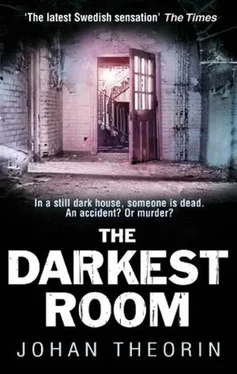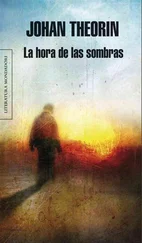Johan Theorin - The Darkest Room
Здесь есть возможность читать онлайн «Johan Theorin - The Darkest Room» весь текст электронной книги совершенно бесплатно (целиком полную версию без сокращений). В некоторых случаях можно слушать аудио, скачать через торрент в формате fb2 и присутствует краткое содержание. Жанр: Детектив, на английском языке. Описание произведения, (предисловие) а так же отзывы посетителей доступны на портале библиотеки ЛибКат.
- Название:The Darkest Room
- Автор:
- Жанр:
- Год:неизвестен
- ISBN:нет данных
- Рейтинг книги:3 / 5. Голосов: 1
-
Избранное:Добавить в избранное
- Отзывы:
-
Ваша оценка:
- 60
- 1
- 2
- 3
- 4
- 5
The Darkest Room: краткое содержание, описание и аннотация
Предлагаем к чтению аннотацию, описание, краткое содержание или предисловие (зависит от того, что написал сам автор книги «The Darkest Room»). Если вы не нашли необходимую информацию о книге — напишите в комментариях, мы постараемся отыскать её.
Winner of Sweden’s Best Crime Novel of the Year
Nominated for a Barry Award International Bestseller
It is bitter mid-winter on the Swedish island of Oland, and Katrine and Joakim Westin have moved with their children to the boarded-up manor house at Eel Point. But their remote idyll is soon shattered when Katrine is found drowned off the rocks nearby. And the old house begins to exert a strange hold over him.
The Darkest Room — читать онлайн бесплатно полную книгу (весь текст) целиком
Ниже представлен текст книги, разбитый по страницам. Система сохранения места последней прочитанной страницы, позволяет с удобством читать онлайн бесплатно книгу «The Darkest Room», без необходимости каждый раз заново искать на чём Вы остановились. Поставьте закладку, и сможете в любой момент перейти на страницу, на которой закончили чтение.
Интервал:
Закладка:
She waved to them and gave the red-painted wooden wall next to the door a friendly pat. Lack of sleep had smudged dark shadows beneath her eyes, but she still smiled toward the car.
Their manor house. Joakim waved at Katrine and smiled back.
“Okay, let’s go,” said Livia from the back seat.
“Go! Go!” yelled Gabriel, waving goodbye to the house.
Joakim started the engine and the headlights came on, illuminating the house. A thin layer of glittering frost covered the ground, an early sign of winter. He would soon have to change over to studded tires.
Livia quickly pulled on her headphones so that she could listen to the adventures of Bamse the bear-she had been
given a tape recorder of her own, and had quickly learned how the buttons worked. When there were songs on the tape, she let Gabriel listen too.
The route to the main coastal highway was a gravel-covered track running between a small, dense deciduous wood and a ditch running along the bottom of an old stone wall. The track was narrow and twisting, and Joakim kept his speed down, gripping the wheel firmly. He hadn’t gotten to know all the bends yet.
Out by the main highway their new metal mailbox was hanging on a post. Joakim slowed down and looked to see if there was any sign of lights from other cars. But everything was dark and silent in both directions. Just as deserted as the opposite side of the road, where a yellowish-brown bog extended into the distance.
They didn’t meet any other cars on their way into Marnäs through the little village of Rörby, and there weren’t many people out and about when they drove into town. A fish van drove past them and a couple of schoolchildren aged about ten were running toward the school, their rucksacks bumping on their backs.
Joakim turned onto the main street and headed for the empty square. A few hundred yards further on was the Marnäs school, and next door, in an enclosed yard with slides and sandboxes and a few trees, was Livia and Gabriel’s preschool. It was a low wooden building with a warm yellow light shining from the big windows.
Several parents were dropping off their children on the sidewalk in front of the school, and Joakim stopped at the end of the row of vehicles without switching off the engine.
Some of the other parents smiled and nodded at him-after the previous day’s article in Ölands-Posten many people in Marnäs now knew who he was.
“Watch out for the cars,” said Joakim. “Stay on the sidewalk.”
“Bye!” said Livia, opening the car door and maneuvering
herself out of the child seat. It wasn’t a protracted farewell;
she was used to him being away.
Gabriel said nothing; when Joakim helped him out of the seat, he just charged away.
“Bye then!” Joakim called after them. “See you tomorrow!” By the time the doors closed, Livia was already several yards away, with Gabriel right behind her. Joakim put the car in gear and swung across the road, back toward Eel Point.
Joakim parked next to Katrine’s car in front of the house and got out to pick up his overnight bag and say goodbye.
“Hello?” he called out in the porch. “Katrine?”
No reply. The house was completely silent.
He went into the bedroom, picked up his case, and went outside again.
Out on the gravel he stopped:
“Katrine?”
There was silence for a few moments, then he heard a muted scraping from the inner courtyard.
Joakim turned his head. It was the sound of the big black wooden barn door being opened. Katrine stepped out of the darkness and waved to him.
“Hi there!”
He waved back and she came over.
“What were you doing?” he asked.
“Nothing,” she said. “Are you leaving now?”
Joakim nodded.
“Drive carefully.”
Katrine leaned over and quickly pressed her mouth against his-a warm kiss in the cold. He breathed in the scent of her skin and her hair for one last time.
“Say hi to Stockholm from me,” she said, giving him a long look. “When you get home, I’ll tell you about the loft.”
“The loft?” said Joakim.
“The hayloft in the barn,” said Katrine.
“What about it?”
“I’ll show you tomorrow,” she said. He looked at her.
“Okay…I’ll call you from Mom’s tonight.” He opened the car door. “Don’t forget to pick up our little lambs.”
At twenty past eight he pulled into the gas station by the turning for Borgholm to pick up the rented trailer. It was already booked and paid for, so all he had to do was hook it up and set off.
The traffic was heavier after Borgholm, and Joakim ended up in the middle of a long line of cars-most were presumably commuters who lived on the island but worked in Kalmar, on the mainland. They maintained a leisurely country speed.
The road curved to the west, and when the ground disappeared beneath it, he was up on the bridge. He liked driving across it, over the span between island and mainland, high above the water in the sound. This morning it was difficult to see the surface of the water down below; it was still too dark. By the time he came off the bridge and joined the coast road toward Stockholm, the sun was rising higher above the Baltic. Joakim could feel its warmth through the side window.
He switched on a radio station playing rock music, put his foot down and headed north at speed, past the small communities along the coast. It was a winding road, beautiful even on a cold, overcast day. It passed through dense pine forests and airy groves of deciduous trees by the water, past inlets and streams that headed out to sea and disappeared.
The road continued to curve gradually westward, and left the coast to head in toward Norrköping. Just outside the town Joakim stopped for a couple of sandwiches in an empty hotel restaurant. He had a choice of seven different bottled mineral waters in the chilled display case-Swedish, Norwegian, Italian,
and French; he realized he was back in civilization, but chose water from the faucet.
After he’d eaten, he carried on, first toward Södertälje and then into Stockholm. He reached the tall apartment blocks in the southwest suburbs of the city at around half past one, and his Volvo and trailer became just one of a multitude of vehicles, large and small, heading for the city center in lane upon lane, past long rows of storage depots, apartment blocks, and stations used by the commuter trains.
Stockholm looked beautiful from a distance, a big city on the Baltic, built on a series of large and small islands, but Joakim felt no real pleasure at being back in the city of his childhood. All he could think of were the crowds and the queues and the struggle to get in first. There was a constant lack of space here; too few places to live, not enough places to park, a shortage of daycare places-even a shortage of burial plots. Joakim had read in the paper that people were being encouraged to cremate their dead nowadays, so that they would take up less space in the churchyard.
He was already missing Eel Point.
The freeway split repeatedly into a boundless labyrinth of bridges and intersections. Joakim chose one of the exits, turned off, and entered the network of the city, with its traffic lights and noise and dug-up streets. At one intersection he sat there trapped between a bus and a garbage truck and watched a woman shoving a child in a buggy across the street. The child was asking something, but the woman was just staring straight ahead with a sullen expression.
Joakim had a couple of things to do in the capital. The first was to call in at a small gallery in Östermalm to pick up a landscape painting, an inheritance he didn’t really want to be responsible for.
The owner wasn’t in, but his elderly mother was there and recognized Joakim. When he had given her his receipt, she went off to unlock a security door and bring out the Rambe painting. It was in a flat wooden box, fastened with screws.
Читать дальшеИнтервал:
Закладка:
Похожие книги на «The Darkest Room»
Представляем Вашему вниманию похожие книги на «The Darkest Room» списком для выбора. Мы отобрали схожую по названию и смыслу литературу в надежде предоставить читателям больше вариантов отыскать новые, интересные, ещё непрочитанные произведения.
Обсуждение, отзывы о книге «The Darkest Room» и просто собственные мнения читателей. Оставьте ваши комментарии, напишите, что Вы думаете о произведении, его смысле или главных героях. Укажите что конкретно понравилось, а что нет, и почему Вы так считаете.










